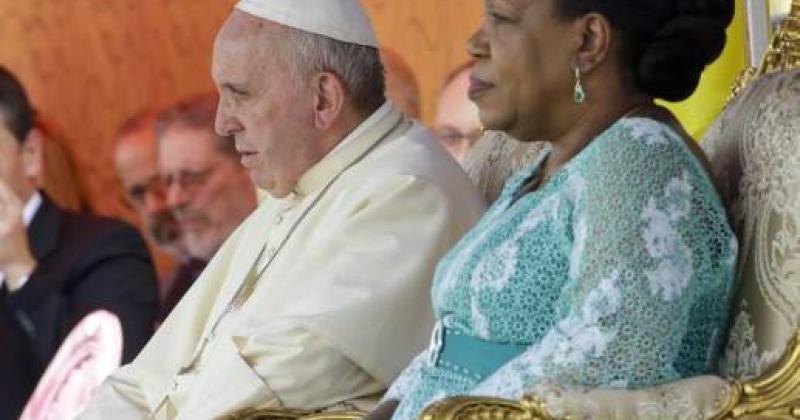At “La Renaissance”, Bangui’s presidential palace, the Pope urged against “the temptation of fear of others, of the unfamiliar, of what is not part of our ethnic group, our political views or our religious confession”. CAR’s interim president said: “God has heard our prayers and has sent us a messenger of peace”.
To understand why Francis chose to visit the Central African Republic (CAR), all one needs to so is listen to the words addressed to him by the interim head of state, Mrs. Catherine Samba-Panza, before the country’s leadership and diplomatic corps. During the gathering at the presidential palace, Mrs. Samba Panza - a 61-year-old lawyer and human rights defender who was elected because she has no links to either of the two sides that have plunged CAR into bloody war – said: “Your visit is a blessing from above, God has heard our prayers and sent us a messenger of peace… Your lesson of courage and determination is an example to us all.”
You have shown, once again, that you are the Pope of the poor, the devastated and those in difficulty,” the president added. “You came here despite the security risk”. She then proceeded to pronounce a mea culpa on behalf of the whole country: “For this reason, it is time for the daughters and sons of this country to recognise their wrongs and ask sincerely for forgiveness. May your blessing offer a new impetus for reconstruction. On behalf of this country’s leadership but also on behalf of all those who have contributed to you being present in this netherworld, I confess to all the evil that has been done here throughout the course of history and I ask for forgiveness, from the bottom of my heart.”
Francis, who is fully aware of the particular importance his physical presence has here, more so that his words, responded with a speech read out in French: “As the Central African Republic progressively moves, in spite of difficulties, towards the normalization of its social and political life, I come to this land for the first time, following my predecessor Saint John Paul II. I come as a pilgrim of peace and an apostle of hope. For this reason, I express my appreciation of the efforts made by the different national and international authorities, beginning with Madam Interim Head of State, to guide the country to this point. It is my fervent wish that the various national consultations to be held in coming weeks will enable the country to embark serenely on new chapter of its history.”
Francis reflected on CAR’s founding motto: “Unity-Dignity-Labour”. A trilogy that “is a sure compass for the authorities called to guide the destiny of the country”.
Firstly, the Pope focused on unity, “a cardinal value for the harmony of peoples. It is to be lived and built up on the basis of the marvellous diversity of our environment, avoiding the temptation of fear of others, of the unfamiliar, of what is not part of our ethnic group, our political views or our religious confession”.
Then dignity, which is “synonymous with the honesty, loyalty, graciousness and honour which characterize men and women conscious of their rights and duties, and which lead them to mutual respect. Each person has dignity. I was interested to learn that Central Africa is the country of the “Zo kwe zo”, the country where everybody is somebody.” Those who have the means to enjoy a decent life, rather than being concerned with privileges, must seek to help those poorer than themselves to attain dignified living conditions, particularly through the development of their human, cultural, economic and social potential. Consequently, access to education and to health care, the fight against malnutrition and efforts to ensure decent housing for everyone must be at the forefront of a development concerned for human dignity.”
Finally, labour. The Pope recalled that central Africans can “improve this marvellous land by wisely exploiting its many resources”. He did not fail to mention the “grave responsibility” of “international partners and multinational societies” “in making use of environmental resources, in development decisions and projects which in any way affect the entire planet”. Francis urged public authorities to “be the first to embody consistently the values of unity, dignity and labour, serving as models for their compatriots”.
After expressing his appreciation for “the efforts made by the international community,represented here by the Diplomatic Corps and the members of the various Missions of the International Organizations,” Francis heartily encouraged them “to continue along the path of solidarity, in the hope that their commitment, together with the activity of the Central African authorities, will help the country to advance, especially in the areas of reconciliation, disarmament, peacekeeping, health care and the cultivation of a sound administration at all levels.”
The Pope drove for four kilometres in a closed vehicle, travelling for another five on the open-topped Popemobile, so that he could greet the crowds of people that lined the sides of the roads.
